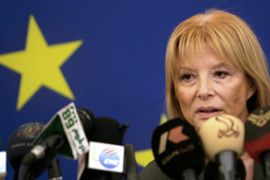Sudan poll fell ‘short of standard’
First multi-party elections in 24 years suffered from ‘deficiencies’, observers say.

“Ultimately the success of the elections will depend on whether Sudan’s leaders take action to promote lasting democratic transformation.”
Earlier, Veronique de Keyser, the head of a 130-member EU observer mission in Sudan, also criticised the poll, saying there had been “significant deficiencies” including logistical problems and intimidation.
She said names were missing from voter registries, election resources were not evenly spread to all parts of the vast country and there were cases of voter intimidation.
“These elections have struggled to reach international standards. They have not reached them all,” she said.
“Although these elections paved the way for democratic progress, it is essential that the shortcomings are addressed.”
Final results due
Final results from the election are due on Tuesday, with Omar al-Bashir, the country’s president, widely expected to win after his rivals boycotted the race.
Sudanese officials began counting millions of ballots on Friday after five days of voting.
| special report |
 |
The election, which was tainted by boycotts and accusations of fraud, was extended for two days after many polling stations opened without ballot papers.
Obsververs had said the election was a step forward for the oil-producing country hoping to evolve into a democracy before a referendum scheduled for next year on independence for south Sudan.
But as the election entered its final day on Thursday, nine members of Sudan’s ruling party National Congress Party (NCP) were reportedly killed in a shooting while voting took place in the south of the country.
Election shooting
Agnes Lokudu, the head of the National Congress Party in south Sudan, blamed Thursday’s shooting in Western Bahr al-Ghazal state on the region’s local military.
The NCP, which dominates the north of the country, rules alongside the southern-based Sudan People’s Liberation Movement (SPLM) as part of a peace deal that ended civil war in 2005, but there are significant tensions between the two parties.
The SPLM denied that the separate south Sudan army was involved in the incident.
The SPLM pulled out of parliamentary voting in most northern states and withdrew Yasser Arman as a candidate for the presidency. The Umma party also pulled its candidate out the presidential race.
Those decisions left little competition for al-Bashir, the leader of the NCP who has been in power for 22 years.